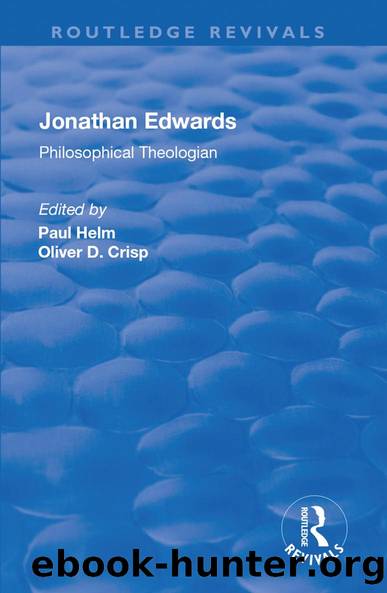Jonathan Edwards: Philsophical Theologian by Oliver D. Crisp Paul Helm

Author:Oliver D. Crisp, Paul Helm [Oliver D. Crisp, Paul Helm]
Language: eng
Format: epub
ISBN: 9780802872692
Barnesnoble:
Publisher: Eerdmans, William B. Publishing Company
Published: 2018-02-20T00:00:00+00:00
Benevolence to Being in General
There is one respect in which the methodology Edwards employs in chapter 1 of The Nature of True Virtue resembles the methodology Aristotle endorses in the Nicomachean Ethics. At the beginning of book VII, Aristotle makes the following observation about his philosophical method:
Here as in all other cases, we must set down the appearances (phainomena) and, first, working through the puzzles (diaporesantas), in this way go on to show, if possible, the truth of all the beliefs we hold (ta endoxa) about these experiences; and, if this is not possible, the truth of the greatest number and the most authoritative.3
For Aristotle, the way things seem to us and the common conceptions and beliefs we have about them should serve as the starting points for ethical theorizing, and one if its main goals should be to preserve and vindicate as many of our common conceptions and beliefs as the problem-solving dimension of theoretical activity will permit.
In The Nature of True Virtue, Edwards proceeds in accord with this Aristotelian method. He begins in chapter 1 with a list of what he takes to be common opinions about the nature of true virtue; the first item on the list is striking. Edwards claims: âWhatever controversies and variety of opinions there are about the nature of virtue, yet all (excepting some skeptics who deny any real difference between virtue and vice) mean by it something beautiful, or rather some kind of beauty or excellency.â4 Subsequent items on the list narrow down the kinds of things that possess the beauty in which virtue consists. It is a common opinion that virtue is not all of beauty; the beauty of a flower or a rainbow is not called virtue. It is also a common opinion that virtue is not all of human beauty; the beauty of a human face or voice is not called virtue. Virtue seems to be some sort of beauty of the mind of beings that have perception and will. According to Edwards, however, âperhaps not everything that may be called a beauty of the mind is properly called virtueâ (p. 539). There seems to be something beautiful about the minds that produce great speculative ideas in subjects such as philosophy or mathematics, but this beauty is a different thing from what is most commonly regarded as virtue. Properly speaking, virtue is the beauty of the qualities and acts of mind that are moral in nature. As Edwards sees it, it is common opinion that they belong âto the disposition and will, or (to use a general word, I suppose equally commonly well understood) to the âheartââ (p. 539). He concludes that âI shall not depart from the common opinion when I say that virtue is the beauty of the qualities and exercises of the heart, or those actions which proceed from themâ (p. 539). In other words, to inquire into the nature of true virtue is just to inquire into what makes any habit, disposition or exercise of the heart truly beautiful.
Download
This site does not store any files on its server. We only index and link to content provided by other sites. Please contact the content providers to delete copyright contents if any and email us, we'll remove relevant links or contents immediately.
Fangirl by Rainbow Rowell(9225)
How to Bang a Billionaire by Alexis Hall(8139)
Wonder by R. J. Palacio(8097)
The Space Between by Michelle L. Teichman(6923)
The Thirst by Nesbo Jo(6921)
Assassin’s Fate by Robin Hobb(6193)
Wiseguy by Nicholas Pileggi(5765)
The Night Circus by Erin Morgenstern(5214)
Paper Towns by Green John(5174)
The Kite Runner by Khaled Hosseini(5161)
Bittersweet (True North #1) by Sarina Bowen(4842)
Gerald's Game by Stephen King(4636)
Too Much and Not the Mood by Durga Chew-Bose(4333)
Pillow Thoughts by Courtney Peppernell(4271)
Goodbye Paradise(3795)
Twelve Days of Christmas by Debbie Macomber(3549)
Good by S. Walden(3543)
The Rosie Effect by Graeme Simsion(3457)
The Cellar by Natasha Preston(3331)
